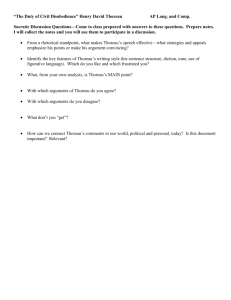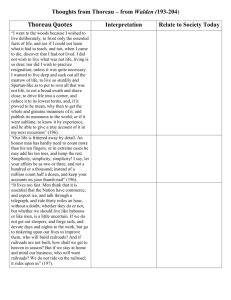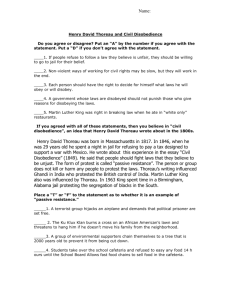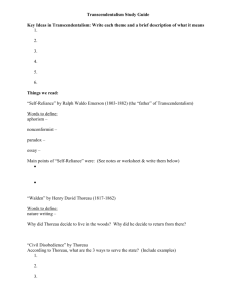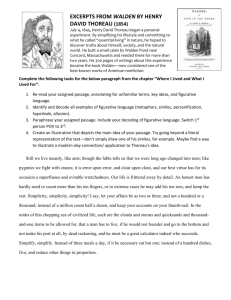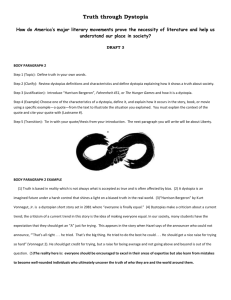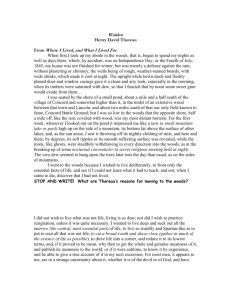Thoreau's 'Where I Lived': Simplicity & Self-Reliance
advertisement
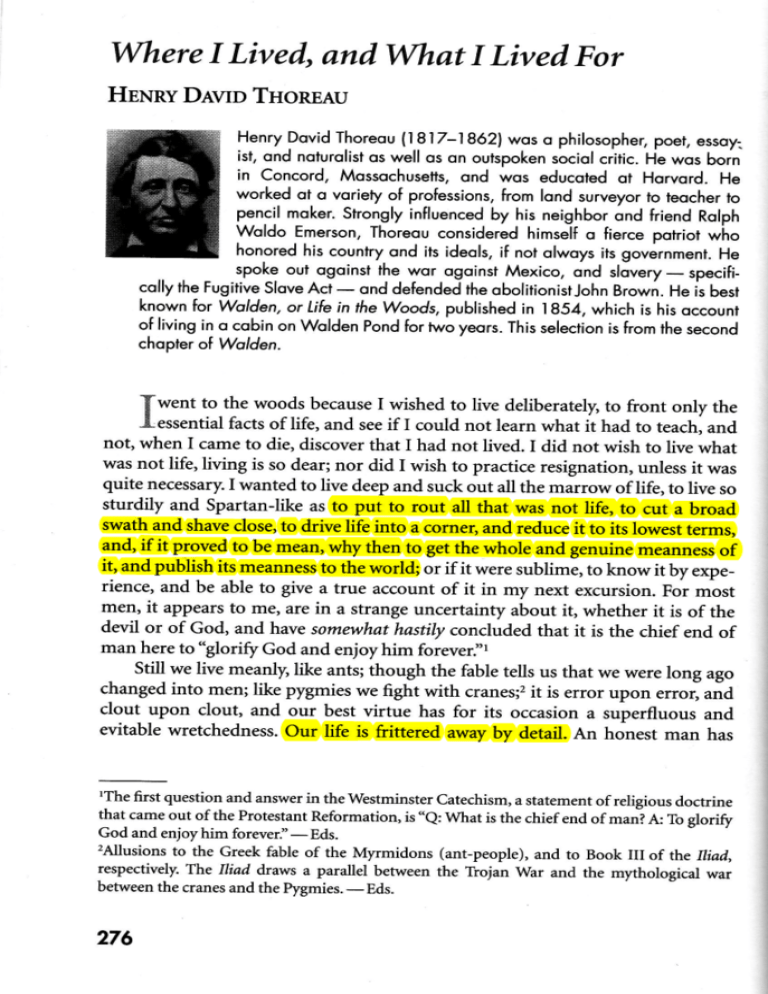
Where I Lived, and What I Lived For HnNny Devn Tnonseu Henry Dovid Thoreou -1817-1862) wos o philosopher, poet, essoyist, ond noturolist os well os on outspoken sociol oitic. He wos boin in Concord, Mossochusetts, ond wos educoted of Horvord. He worked ot o voriety of professions, from lond surveyor to teocher to pencil moker. Strongly influenced by his neighbor ond friend Rolph Woldo Emerson, Thoreou considered himself o fierce potriot w'ho honored his country ond its ideols, if not olwoys its government. He spoke out ogoinst the wor ogoinst Mexico, ond slovery specificolly the Fugitive slove Act ond defended the obolitionistJohn Brown. -He is best known for wolden, or Life in the woods, published in I g54, whlch is his occount of living in o cobin on Wolden Pond for two yeors. This selection is from the second chopter of Wolden. [went to the woods because I wished to live deliberately, to front only the ressential facts of life, and see if I could not learn what it had to teach, and not, when I came to die, discover that I had not lived. I did not wish to live what was not life, living is so dear; nor did I wish to practice resignation, unless it was quite necessary. I wanted to live deep and suck out all the marrow of life, to live so sturdily and SpartanJike as to put to rout all that was not life, to cut a broad swath and shave close, to drive life into a corner, and reduce it to its lowest terms, and, if it proved to be mean, whythen to get the whole and genuine meanness of it, and publish its meanness to the world; or if it were sublime, to know it by experience, and be able to give a true account of it in my next excursion. For most men' it appears to me, are in a strange uncertainty about it, whether it is of the devil or of God, and have somewhat hastily concluded that it is the chief end of man here to "glorifr God and enjoyhim forever."r Still we live meanly,like ants; though the fable tells us that we were long ago changed into men; like pygmies we fight with cranes;2 it is error upon error, and clout upon clout, and our best virtue has for its occasion a superfluous and our life is frittered away by detail. An honest man has evitable wretchedness. tThe first question and answer in the Westminster Catechism, a statement of religious doctrine that came out of the Protestant Reformation, is "e: what is the chief end of -"rr? A, To glorifr God and enjoyhim forever."-Eds. 2Allusions to the Greek fable of the Myrmidons (ant-people), and to Book III of the lliad, respectively. The Iliad draws a parallel between the Trojan War and the mythological war between the cranes and the Pygmies. 276 -Eds. THOREAU . WHERE I LIVED, AND WHAT I LIVED FOR 277 need to count more than his ten fingers, or in extreme cases he mayadd his toes, and lump the rest. Simpliciry simplicity, simplicity! I say,let your affairs not a hundred or a thousand; instead of a million count a dozen, and keep your accounts on your thumb-nail. In the midst of this ing sea of civilized life, such are the clouds and storms and quicksands and nd-one items to be allowed for, that a man has to live, if he would not and go to the bottom and not make his port at all, by dead reckoning, he must be a great calculator indeed who succeeds. Simplift, simplify. Instead three meals a day, if it be necessary eat but one; instead of a hundred dishes, and reduce other things in proportion. Our life is like a German Confedermade of up pettF states, with its boundary forever fluctuating, so that even a cannot tell you how it is bounded at any moment. The nation itself, with its so-called internal improvements, which, by the -way are all external and ial, is just such an unwieldy and overgrown establishment, cluttered with iture and tripped up by its own traps, ruined by luxury and heedless expense, want of calculation and a worthy aim, as the million households in the land; the only cure for it, as for them, is in a rigid economy, a stern and more than simplicity of life and elevation of purpose. It lives too fast. Men think it is essential that the Nation have commerce, and export ice, and talk a telegraph, and ride thirty miles an hour, without a doubt, wh ether they or noq but whether we should live like baboons or like men, is a little uncerIf we do not get out sleepers,3 and forge rails, and devote days and nights to work, but go to tinkering upon o:ur livesto improve them,whowill build railAnd if railroads are not built, how shall we get to heaven in season? But if stayat home and mind our business, who will want railroads? We do not ride the railroad; it rides upon us. Did you ever think what those sleepers are that ie the railroad? Each one is a man, an Irishman, or aYankee man. The rails laid on them, and they are covered with sand, and the cars run smoothly over They are sound sleepers, I assure you. And every few years a new lot is laid and run over, so that, if some have the pleasure of riding on a rail, others the misfortune to be ridden upon. And when they run over a man that is ing in his sleep, a supernumerary sleeper in the wrong position, and wake up, they suddenly stop the cars, and make a hue and cry about it, as if this an exception. I am glad to know that it takes a gang of men for every five to keqp the sleepers down and level in their beds as it is, for this is a sign that may sometimes get up again. Why should we live with such hurry and waste of life? We are determined to starved before we are hungry. Men say that a stitch in time saves nine, and so take a thousand stitches today to save nine tomorrow. As for work, we haven't of any consequence. We have the Saint Vitus' dance, and cannot possibly keep as two or three, and sleepers means "rafuoad ties." - Eds. 278 cHAPTER6 . coMMUNITY our heads still. If I should only give a few pulls at the parish bell-rope, as for a fire, that is, without setting the bell, there is hardly a man on his farm in the outskirts of Concord, notwithstanding that press of engagements which was his excuse so many times this morning, nor a boy, nor a woman, I might almost say, but would foresake all and follow that sound, not mainly to save propertF from the flames, but, if we will confess the truth, much more to see it burn, since burn it must, and or to see it put out, and have a hand in it, we, be it known, did not set it on fire if that is done as handsomely; yes' eYen if it were the parish church itself' Hardly a man takes a half-hour's nap after dinner, but when he wakes he holds up his head and asls, "What's the news?" as if the rest of mankind had stood his sentinels. Some give directions to be waked every half-hour, doubtless for no other purpor"; urd th.n, to pay for it, they tell what they have dreamed. After a night's sleep ih. ,"*, is as indiipensable as the breakfast. "Pray tell me anything new that has and he reads it over his coffee and happened to a man anywhere on this globe" morning on the Wachito River; this ,ois-, that a man has had his eyes gouged out never dreaming the while that he lives in the dark unfathomed mammoth caYe of this world, and has but the rudiment of an eye himself' For my part, I could easily do without the post-office. I think that there are very few important communications made through it. To speak critically, I never - I wrote this some years ago received more than one or two letters in my life an institution through commonly, is, penny-post The postage. that were worth the - - which you seriously offer a man that Penny for his thoughts which is so often safely offered in jest. And I am sure that I never read any memorable news in a newspaper. If we read of one man robbed, or murdered, or killed by accident, or one house burned, or one vessel wrecked or one steamboat blown up, or one cow run over on the Western Railroad, or one mad dog killed, or one lot of grasshopwe never need read of another. One is enough. If you are pers in the winter what do you care for a myriad instances and appliprinciple, the icquainted with as it is called, is gossip, and they who edit and news, all cations? To a philosopher read it are old women over their tea. Yet not a few ate gteedy after this gossip' There was such a rush, as I hear, the other day at one of the offices to learn the foreign news by the last arrival, that several large squares of plate glass belonging to which I seriously think a the establishment were broken by the ready wit might write a twelvemonth, or twelve years, beforehand with suffrcient accuracy. As ior Spain, for instance, if you know how to throw in Don Carlos and the Infanta, and bon Pedro and seville and Granada, from time to time in the they may have changed the names a little since I saw the right proportions - pressure and serve up a bullfight when other entertainments fail, it will be true io th. l"tt.t, and give us as good an idea of the exact state or ruin of things in pup"ri Spain as the most succinct and lucid reports under this head in the newspapers; urrd for England, almost the last significant scrap of news from that quarter was "t the reyolution of 1649; and if you have learned the history of her crops for an average year, you never need attend to that thing again, unless your speculations pecuniary character. If one may judge who rarely looks into the ur" oiu -.rely IHOREAU . WHERE ILIVED, AND WHAT ILIVED FOR 279 newspapers, nothing new does ever happen in foreign parts, a French revolution not excepted. what news! how much more important to know what that is which was never old! "Kieou-pe-yu (great dignitary of the state of wei) sent a man to Khoung-tseu to know his news. Khoung-tseu caused the messenger to be seated near him, and questioned him in these terms: what is yo,rr doing? The -urt.. messenger answered with respect: My master desires to diminish the number of his faults, but he cannot come to the end of them. The messenger being gone, the philosopher remarked: what a worthy messenger! what a wtrthy messenger!,, The preacher, instead of vexing the ears of drowsy farmers on theii day of rest at the end of the week for Sunday is the fit conclusion of an ill-spent week, and - beginning not the fresh and brave of a new one with this one other draggletail of a sermon, should shout with thundering- voice, "pause! Avast! wty ,o seeming fast, but deadly slow?" Shams and delusions are esteemed for soundless truths, while reality is fabu- bus. If men would steadily observe realities only, and not allow themselves to be deluded, life, to compare it with such things as we know, would be like a fairy tale and the Arabian Nights' Entertainments. adhas a right to be, music If we respected only what is inevitable and poetrywould resound along the streets. when we are unhurried and wise, we perceive that only great and worthy things have any permanent and absolute existence, that petty fears and petty pleasures are but the fu9* of the reality. This is always exhilarating and sublime. By closing the eyes ad slumbering, and consenting to be deceived by shows, men establish and confrm their dailylife of routine and habit everywhere, which still is built on purely iftrcory foundations. children, who play life, discern its true law and relations more clearly than men, who fail to live it worthily, but who think that they are riser by experience, that is, by failure. I have read in a Hindoo book, that..there ; a king's son, who, being expelled in infancy from his native city, was brought by a forester, and, growing up to maturity in that state, imagined himself to g to the barbarous race with which he lived. one of his father's ministers ing discovered him, revealed to him what he was, and the misconception of character was removed, and he knew himself to be a prince. so soul," continthe Hindoo philosopher, "from the circumstances in which it is placed, miss its own character, until the truth is revealed to it by some holy teacher and r it knows itself to be Brahmel'a I perceive that we inhabitants of New England this mean life that we do because our yision does not penetrate the surface of Bs.we think that that is which appears to be. If a man should walk through town and see only the reality, where, think you, would the ..Milldam,,, go to? should give us an account of the realities he beheld there, we should not recthe place in his description. Look at the meetinghouse, or a courthouse, or the three main 's Hindu gods, now spelled Brahma.-Eds. business center. - Eds. 280 cHAPTER6 . coMMUNlrY jail, or a shop, or a dwelling-house, and say what that thing really is before a true gaze, andthey would all go to pieces in your account of them. Men esteem truth iemote, in the outskirts of the system behind the farthest star, before Adam and after the last man.In eternitythere is indeed something true and sublime. But all these times and places and occasions are now and here. God himself culminates in the present moment, and will never be more divine in the lapse of all the ages. And we are enabled to apprehend at all what is sublime and noble only by the perpetual instilling and drenching of the reality that surrounds us. The universe .orit"t tly and obediently answers to our conceptions; whether we travel fast or slow, the track is laid for us. Let us spend our lives in conceiving then. The poet or the artist never yet had so fair and noble a design but some of his posterity at least a could accomplish it. Let us spend one day as deliberately as Nature, and not be thrown off the track by every nutshell and mosquito's wing that falls on the rails. Let us rise early and fasi, or breakfast, gently and without perturbation; let company come and let company go,let the bells ring and the children cry- determined to make a day of it. Whyihould we knock under and go with the stream? Let us not be upset and overwheimed in that terrible rapid and whirlpool called a dinner, situated in the meridian shallows. Weather this danger and you are safe, for the rest of the way is downhill. With unrelaxed nerves, with morning vigor, sail by it,looking another way, tied to the mast like Lllysses. If the engine whistles, let it whistle till it is hoarse for its pains. If the bell rings, why should we run? We will consider what kind of music they are like. Let us settle ourselves and work and wedge our feet downward through the mud and slush of opinion, and prejudice, and tradition, and delusion, and appearance, that alluvion which coYers the globe, through Paris and London, through NewYork and Boston and concord, through church and State, through poetry and philosophy and religion, till we come to a hard bottom and rocks in place, which we can call reality,and say, This is, and no mistake; and then begin, having a point d'appui,6 below freshet and frost and fire, a place where you might found a wall or a state, or set a lamppost safely, or perhaps a gauge, not a Nilometer, but a Realometer, that future ages might know how deep from time to time. If you stand see the sun glimmer on both right fronting and face to face to edge dividing you through its sweet its surfaces, as if it were a cimeter, and feel the heart and marrow, and so you will hrpptly conclude your mortal career. Be it life or death, we crave only reality. If we are really dying, let us hear the rattle in our throats and feel cold in the extremities; if we are alive, let us go about our a freshet of shams and appearances had gathered a fact, you will business. but the stream I go afishing in. I drink at it; but while I drink I see the sandy bottom and detect how shallow it is. Its thin current slides away but eterTime is 6French, "foundation." - Eds. THOREAU . WHERE ILIVED, AND WHAT ILIVED FOR 28I nity remains. I would drink deeper; fish in th. slv', whose bottom is pebbly with $tars. I cannot count one. I know not the first letter ofthe alphabet. I have always been regretting that I was not as wise as the day I was born. The intellect is a deaver; it discerns and rifts its way into the secret of things. I do not wish to be ffF more busy with my hands than is necessary. My head is hands and feet. I feel dl *y best faculties concentrated in it. My instinct tells me that my head is an ugan for burrowing, as some creatures use their snout and fore paws, and with it rwould mine and burrow my way through these hills. I think that the richest vein fo somewhere hereabouts, so by the divining-rod and thin rising vapors, I judge; mdhere I will begin to mine. for Discussion what is Henry David Thoreau calling for early in paragraph 2 when he writes, 'Simplicity, simplicity, simplicity! "? Ihoreau writes, "We do not ride on the railroad; it rides upon us,, (para. 2). Consider an electronic device (such as a notebook computer, a cell phone, a pDA, or an mp3 player). what would Thoreau say about it? Has this device helped to simpli$. ourlives, or has it had a negative impact on them? what does Thoreau mean when he says, "As for work,wehavenit any of any consequence" (para. 3 )? What is his definition of work? How do you interpret this assertion: "Shams and delusions are esteemed for roundless truths, while reality is fabulous" (para. 6)? use that as a topic sentence, md develop it with examples from your own experience. Do you think Thoreaut advice and sentiments in this essay are meant as recommendations for living onet entire life or as suggestions for periodically reflecting onlifet true meaning? Is he suggesting isolation as a lifestyle? today's terms, how would you characterize Thoreau's politics? Is he very conserrative or very progressive? Is he somewhere in between? h on Rhetoric ond Style In the first paragraph, what does Thoreau declare as his higher purpose? Gte and explain the antitheses in the first paragraph. What are the meanings of dear and. mean as used in paragraph 1 ? What is the rhetorical effect of the similes inparagraph2? Describe the extended metaphor in paragraph 2. What effect does it have? lllhat effect does Thoreau create with his repetitions? cite several examples. l\lhat paradox does Thoreau develop concerning the railroad inparagraph2? hragraph 3 begins with a rhetorical question. How effectively does.the rest of the pragraph answer it? 282 cHAPTER6 . coMMUNtrY meaning of the phrase "starved before we are hungry''in sentence 2 ofparagraph 3. t0. Compare the probable rhetorical effect of paragruph 4 at the time it was written 9. Discuss the with its effect today. 11. Sometimes even the slightest stytistic feature can work effectively as a rhetorical strategy. What is the effect of the alliterative phrase "freshet and frost and fire" in paragraphT? 12. In the concluding paragraph, Thoreau develops two metaphors regarding time and the intellect. What are they? What is their effect? Suggestions for Writing 1. In paragraph 5, Thoreau writes, "What news! how much more important to know what that is which was never old!"Write an essay in which you evaluate Thoreau's own writing according to this thought. Consider how this essay appeals to tlvo audiences: Thoreau's contemPoraries and today's readers. Thoreau extols the virtues of individualism and self-sufficienry. Discuss how living according to these virtues can jeopardrze the community; consider specific circumstances when such jeopardy might occur. Write a response to Thoreau, telling him how modern technology has influenced 3. how we communicate. Acknowledge how he did or did not anticipate our modern 2. In this essay, condition. 4. Using the reflective style of Thoreau, write your own philosophical "Where I Live, andWhat I Live For" (note present tense). essay entitled
